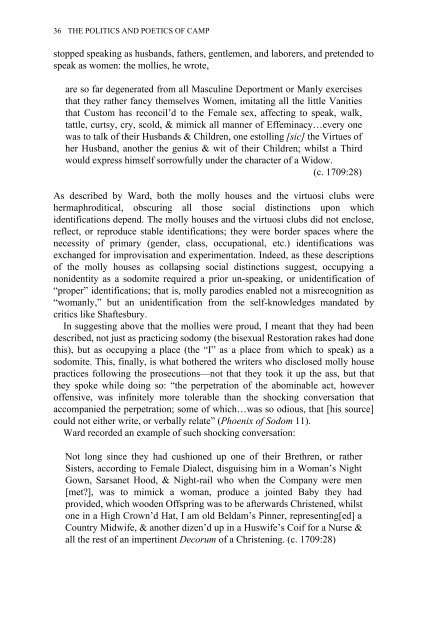Edited by Moe Meyer - Get a Free Blog
Edited by Moe Meyer - Get a Free Blog
Edited by Moe Meyer - Get a Free Blog
You also want an ePaper? Increase the reach of your titles
YUMPU automatically turns print PDFs into web optimized ePapers that Google loves.
36 THE POLITICS AND POETICS OF CAMP<br />
stopped speaking as husbands, fathers, gentlemen, and laborers, and pretended to<br />
speak as women: the mollies, he wrote,<br />
are so far degenerated from all Masculine Deportment or Manly exercises<br />
that they rather fancy themselves Women, imitating all the little Vanities<br />
that Custom has reconcil’d to the Female sex, affecting to speak, walk,<br />
tattle, curtsy, cry, scold, & mimick all manner of Effeminacy…every one<br />
was to talk of their Husbands & Children, one estolling [sic] the Virtues of<br />
her Husband, another the genius & wit of their Children; whilst a Third<br />
would express himself sorrowfully under the character of a Widow.<br />
(c. 1709:28)<br />
As described <strong>by</strong> Ward, both the molly houses and the virtuosi clubs were<br />
hermaphroditical, obscuring all those social distinctions upon which<br />
identifications depend. The molly houses and the virtuosi clubs did not enclose,<br />
reflect, or reproduce stable identifications; they were border spaces where the<br />
necessity of primary (gender, class, occupational, etc.) identifications was<br />
exchanged for improvisation and experimentation. Indeed, as these descriptions<br />
of the molly houses as collapsing social distinctions suggest, occupying a<br />
nonidentity as a sodomite required a prior un-speaking, or unidentification of<br />
“proper” identifications; that is, molly parodies enabled not a misrecognition as<br />
“womanly,” but an unidentification from the self-knowledges mandated <strong>by</strong><br />
critics like Shaftesbury.<br />
In suggesting above that the mollies were proud, I meant that they had been<br />
described, not just as practicing sodomy (the bisexual Restoration rakes had done<br />
this), but as occupying a place (the “I” as a place from which to speak) as a<br />
sodomite. This, finally, is what bothered the writers who disclosed molly house<br />
practices following the prosecutions—not that they took it up the ass, but that<br />
they spoke while doing so: “the perpetration of the abominable act, however<br />
offensive, was infinitely more tolerable than the shocking conversation that<br />
accompanied the perpetration; some of which…was so odious, that [his source]<br />
could not either write, or verbally relate” (Phoenix of Sodom 11).<br />
Ward recorded an example of such shocking conversation:<br />
Not long since they had cushioned up one of their Brethren, or rather<br />
Sisters, according to Female Dialect, disguising him in a Woman’s Night<br />
Gown, Sarsanet Hood, & Night-rail who when the Company were men<br />
[met?], was to mimick a woman, produce a jointed Ba<strong>by</strong> they had<br />
provided, which wooden Offspring was to be afterwards Christened, whilst<br />
one in a High Crown’d Hat, I am old Beldam’s Pinner, representing[ed] a<br />
Country Midwife, & another dizen’d up in a Huswife’s Coif for a Nurse &<br />
all the rest of an impertinent Decorum of a Christening. (c. 1709:28)


